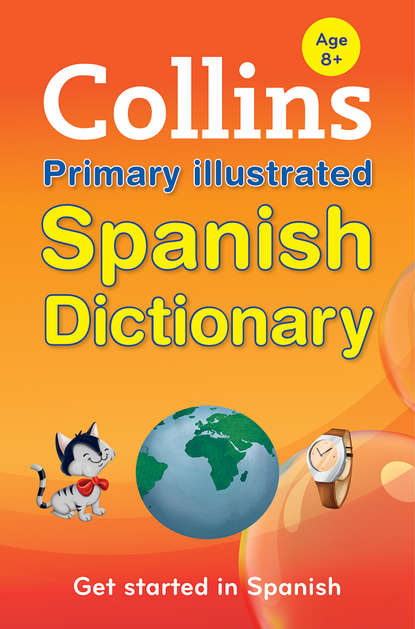
Полная версия:
Collins Primary Dictionaries
furioso (FEM furiosa) ADJECTIVE
furious
el fútbol NOUN
football jugar al fútbol to play football
el futbolín (PL los futbolines) NOUN
table football
el/la futbolista NOUN
footballer Quiere ser futbolista. He wants to be a footballer.
G g
las gafas NOUN
1 glasses Lleva gafas. He wears glasses. Había unas gafas encima de la mesa. There was a pair of glasses on the table. gafas de sol sunglasses
2 goggles
Gales MASC NOUN
Wales el País de Gales Wales
la galleta NOUN
biscuit una galleta salada a cracker
gallina FEM NOUN
hen
el gallo NOUN
cock
el gamberro la gamberra NOUN
hooligan
la gana NOUN
Hazlo como te dé la gana. Do it however you like. Lo hizo de mala gana. She did it reluctantly. Tengo ganas de que llegue el sábado. I’m looking forward to Saturday.
¡No me da la gana! I don’t want to!
el ganador la ganadora NOUN
winner
ganar VERB
1 to win Lo importante no es ganar. Winning isn’t the most important thing. Con eso no ganas nada. You won’t achieve anything by doing that.
2 ganar a to beat Ganamos al Olimpic tres a cero. We beat Olimpic three-nil.
3 to earn Gana un buen sueldo. He earns a good wage.
el garaje NOUN
garage
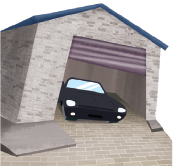
la garganta NOUN
throat Me duele la garganta. I’ve got a sore throat.
el gas (PL los gases) NOUN
gas ¿Te huele a gas? Can you smell gas? agua mineral sin gas still mineral water agua mineral con gas sparkling mineral water
la gaseosa NOUN
Did you know…?
Gaseosa is a sweet fizzy drink a bit like lemonade or soda.
la gasolina NOUN
petrol
la gasolinera NOUN
petrol station
gastado (FEM gastada) ADJECTIVE
worn
gastar VERB
1 to spend
2 to use Gastamos mucha electricidad. We use a lot of electricity. Se han gastado las pilas. The batteries have run out. Le gastamos una broma a Juan. We played a joke on Juan.
la gata NOUN
cat andar a gatas to crawl El niño todavía anda a gatas. The baby is still crawling.

el gato NOUN
cat
la gaviota NOUN
seagull
el gemelo la gemela NOUN
identical twin
los gemelos NOUN
binoculars
general (FEM general) ADJECTIVE
general
por lo general generally
genial (FEM genial) ADJECTIVE
brilliant
el genio NOUN
1 temper ¡Menudo genio tiene tu padre! Your father has got such a temper! Tiene mal genio. He has a bad temper
2 genius ¡Eres un genio! You’re a genius!
la gente NOUN
people Había poca gente en la sala. There weren’t many people in the room.
la geografía NOUN
geography

el gesto NOUN
Hizo un gesto de alivio. He looked relieved. Me hizo un gesto para que me sentara. He signalled for me to sit down.
la gimnasia NOUN
gymnastics Mi madre hace gimnasia todas las mañanas. My mother does some exercise every morning.
el gimnasio NOUN
gym
girar VERB
to turn Giré la cabeza para ver quién era. I turned my head to see who it was.
global (FEM global) ADJECTIVE
global
el globo NOUN
balloon
el gobierno NOUN
government
el gol NOUN
goal Metió un gol. He scored a goal.
la golosina NOUN
sweet
goloso (FEM golosa) ADJECTIVE
Soy muy golosa. I’ve got a very sweet tooth.
el golpe NOUN
knock Oímos un golpe en la puerta. We heard a knock at the door. Me he dado un golpe en el codo. I banged my elbow. Se dio un golpe contra la pared. He hit the wall. de golpe suddenly De golpe decidió marcharse. He suddenly decided to leave.
golpear VERB
1 to hit Me golpeó en la cara con su raqueta. He hit me in the face with his racquet.
2 to bang El maestro golpeó el pupitre con la mano. The teacher banged the desk with his hand.
la goma NOUN
1 rubber

¿Me prestas la goma? Can you lend me your rubber?
2 elastic band Necesito una goma para el pelo. I need an elastic band for my hair.
gordo (FEM gorda) ADJECTIVE
fat Estoy muy gordo. I’m very fat.
la gorra NOUN
cap de gorra for free Entramos de gorra. We got in for free.
el gorro NOUN
hat
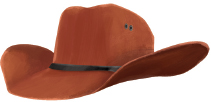
Llevaba un gorro de lana. He wore a woolly hat. un gorro de baño a swimming cap
la gota NOUN
drop Solo bebí una gota de zumo. I only had a drop of juice. Están cayendo cuatro gotas. It’s spitting.
grabar VERB
1 to record Lo grabaron en directo. It was recorded live.
2 to tape Quiero grabar esta película. I want to tape this film.
3 to engrave
la gracia NOUN
Sus chistes tienen mucha gracia. His jokes are very funny. Yo no le veo la gracia. I don’t see what’s so funny. Me hizo mucha gracia. It was so funny. No me hace gracia tener que salir con este tiempo. I’m not too pleased about having to go out in this weather.
gracias a thanks to ¡Gracias! Thank you! ¡Muchas gracias! Thanks very much! dar las gracias a alguien to thank somebody
gracioso (FEM graciosa) ADJECTIVE
funny ¡Qué gracioso! How funny!
el grado NOUN
degree Estaban a diez grados bajo cero. It was ten degrees below zero.
la gramática NOUN
grammar
el gramo NOUN
gram
gran ADJECTIVE ▷see grande un gran artista a great artist un gran número de gente a large number of people
Gran Bretaña FEM NOUN
Great Britain
grande (FEM grande) ADJECTIVE
Language tip
grande becomes gran before a singular noun.
1 big ¿Cómo es de grande? How big is it? La camisa me está grande. The shirt is too big for me. unos grandes almacenes a department store
2 large un gran número de visitantes a large number of visitors
el granizo NOUN
hail
la granja NOUN
farm
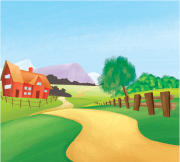
el grano NOUN
1 spot Me ha salido un grano en la frente. I’ve got a spot on my forehead.
2 grain
gratis
gratis can be an adjective or an adverb.
A (FEM, PL gratis) ADJECTIVE
free La entrada es gratis. Entry is free.
B ADVERB
for free Te lo arreglan gratis. They’ll fix it for free.
grave (FEM grave) ADJECTIVE
serious Tenemos un problema grave. We’ve got a serious problem.
el grifo NOUN
tap Abre el grifo. Turn on the tap. Cierra el grifo. Turn off the tap.
la gripe NOUN
flu
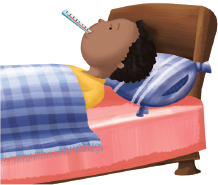
Tengo la gripe I’ve got flu.
gris ADJECTIVE, MASC NOUN
grey
gritar VERB
1 to shout Niños, no gritéis tanto. Children, stop shouting so much.
2 to scream El enfermo no podía dejar de gritar. The patient couldn’t stop screaming.
el grito NOUN
1 shout ¡No des esos gritos! Stop shouting like that!
2 scream Oímos un grito en la calle. We heard a scream outside.
grosero (FEM grosera) ADJECTIVE
rude
la grúa NOUN
crane
el grupo NOUN
1 group Los alumnos trabajan en grupo. The students work in groups.
2 band un grupo de rock a rock band
el guante NOUN
glove unos guantes a pair of gloves
guapo (FEM guapa) ADJECTIVE
1 handsome
2 pretty
guardar VERB
1 to put away Los niños guardaron los juguetes. The children put away their toys.
2 to keep No sabe guardar un secreto. He can’t keep a secret.
3 to save Debes guardar el fichero. You must save the file.
la guardería NOUN
nursery
el/la guardia NOUN
police officer

el guarro la guarra NOUN
¡Eres un guarro! You’re disgusting!
guay (FEM guay) ADJECTIVE
cool ¡Qué moto más guay! What a cool bike!
la guerra NOUN
war
guía
A MASC/FEM NOUN
guide
B FEM NOUN
guidebook Compré una guía turística de Londres. I bought a tourist guidebook to London.
guiñar VERB
to wink Me guiñó el ojo. He winked at me.
la guitarra NOUN
guitar
el gusano NOUN
worm
gustar VERB
Me gustan las uvas. I like grapes. ¿Te gusta viajar? Do you like travelling? Me gusta su hermana. I fancy his sister. Le gusta más llevar pantalones. She prefers to wear trousers.
H h
ha VERB ▷see haber Me ha comprado un libro. He has bought me a book.
haber VERB
to have
Language tip
haber is used to make the past tense of verbs.
He comido. I’ve eaten. ¿Habéis comido? Have you eaten? Había comido. I’d eaten. Se ha sentado. She’s sat down. hay there is/there are
Language tip
hay has two meanings: there is and there are. Look at the examples.
Hay una iglesia en la esquina. There’s a church on the corner. Hay treinta alumnos en mi clase. There are thirty pupils in my class. ¿Hay entradas? Are there any tickets? hay que you must Hay que ser respetuoso. You must be respectful.
la habitación (PL las habitaciones) NOUN
1 bedroom

Ésta es la habitación de mi hermana. This is my sister’s bedroom.
2 room una habitación doble a double room una habitación individual a single room
el/la habitante NOUN
inhabitant los habitantes de la zona people living in the area
hablar VERB
1 to speak ¿Hablas español? Do you speak Spanish?
2 to talk Estuvimos hablando toda la tarde. We were talking all afternoon. ¿Has hablado con el profesor? Have you spoken to the teacher? Solo hablan de fútbol. They only talk about football. ¡Ni hablar! No way!
habré VERB ▷see haber ¿Dónde habré puesto las llaves? Where did I put my keys?
hacer VERB
1 to make Tengo que hacer la cama. I’ve got to make the bed. Estáis haciendo mucho ruido. You’re making a lot of noise.
2 to do ¿Qué haces? What are you doing? Tengo que hacer los deberes. I have to do my homework. Hace mucho deporte. She does a lot of sport. hacer clic en algo to click on something
3 to be Hace calor. It’s hot. hace ago/for
Language tip
When talking about time, hace can mean ago or for. Look at the examples.
Terminé hace una hora. I finished an hour ago. Hace un mes que voy. I’ve been going for a month. ¿Hace mucho que esperas? Have you been waiting long?
■ hacerse to become Quiere hacerse famoso. He wants to become famous.
hacia PREPOSITION
towards Venía hacia mí. He was coming towards me. hacia adelante forwards hacia atrás backwards hacia dentro inside hacia fuera outside hacia abajo down hacia arriba up
hago VERB ▷see hacer Y ahora, ¿qué hago? And now, what do I do?
el hambre NOUN
hunger tener hambre to be hungry No tengo mucha hambre. I’m not very hungry.
la hamburguesa NOUN
hamburger
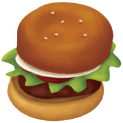
haré VERB ▷see hacer Lo haré mañana. I’ll do it tomorrow.
hartar VERB
hartarse de algo to get fed up with something Me harté de estudiar. I got fed up with studying.
harto (FEM harta) ADJECTIVE
fed up Estoy harto de repetirlo. I’m fed up with repeating it. ¡Me tienes harto! I’m fed up with you!
hasta
hasta can be a preposition, conjunction or adverb.
A PREPOSITION, CONJUNCTION
till Está abierto hasta las cuatro. It’s open till four o’clock. ¿Hasta cuándo? How long? ¿Hasta cuándo te quedas? — Hasta la semana que viene. How long are you staying? — Till next week. hasta que until Espera aquí hasta que te llamen. Wait here until you’re called.
¡Hasta luego! See you! ¡Hasta mañana! See you tomorrow! ¡Hasta el sábado! See you on Saturday!
B ADVERB
even Estudia hasta cuando está de vacaciones. He even studies when he’s on holiday.
hay VERB ▷see haber Hay tres casas. There are three houses.
haz VERB ▷see hacer Haz lo que quieras. Do whatever you like.
he VERB ▷see haber No he estado nunca en Londres. I’ve never been to London.
hecho
hecho can be an adjective or part of the verb hacer.
A (FEM hecha) ADJECTIVE
made ¿De qué está hecho? What’s it made of? hecho a mano handmade ¡Bien hecho! Well done!
B VERB ▷see hacer Ya lo he hecho. I’ve done it already.
helado
helado can be a noun or an adjective.
A MASC NOUN
ice cream

un helado de chocolate a chocolate ice cream
B (FEM helada) ADJECTIVE
1 frozen El lago está helado. The lake’s frozen over.
2 freezing ¡Estoy helado! I’m freezing!
el helicóptero NOUN
helicopter
hemos VERB ▷see haber Ya hemos llegado. We’ve arrived.
la herida NOUN
wound
herido (FEM herida) ADJECTIVE
1 wounded
2 injured
herir VERB
to wound Lo hirieron en el pecho. He was wounded in the chest.
la hermana NOUN
sister
la hermanastra NOUN
stepsister
el hermanastro NOUN



